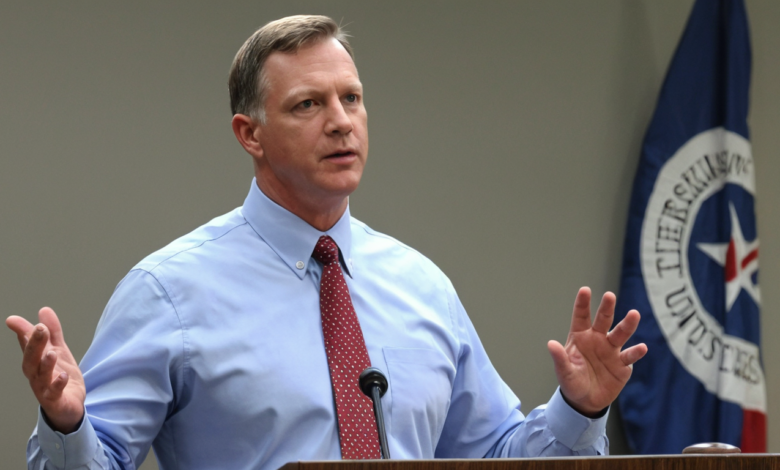Jeffery Hays Tennessee DHS: Leadership Insights and Strategies

Introduction
Over the years, Jeffery Hays Tennessee DHS has been a constant and energetic presence at the Tennessee DHS of Human Services. He has served as a beacon for the department. Jeffery Hays has worked tirelessly to improve the organization. His efforts have focused on enhancing organizational prospects. He has also aimed to fortify the services provided by DHS. During his tenure, he has actively transformed the department. His goal has been to make it more organized, humane, and responsive to citizens’ needs. This paper examines Jeffery Hays’s leadership style, his strategies, and their impact on social services in Tennessee.
Embracing a Vision of Service and Accessibility
Fundamental to Hays leadership at Jeffery Hays Tennessee DHS is a vision that is driven by accessibility and quality service. His strategy specifically focuses on giving voice to the employees to solve community problems. It also aims to make services available to everyone who needs them in Tennessee. This vision is reflected in various key strategies:
- Enhanced Service Delivery: Hays has — and service delivery in a bid to simplify the application and enrollment procedures.
- Digital Transformation: he Department of Homeland Security, all departments have focused on electronic resources. These resources provide easy Internet access to information and services.
- Community Outreach: Accepting the fact that each community has its own special requirements, Hays has actively supported the campaigns that will ensure that residents are well linked to what they need.
DHS prioritizes access, making it well-positioned to address the needs of individuals and families. This is especially beneficial for those from disadvantaged areas, including rural settings. DHS has enhanced user satisfaction through this focus on accessibility. It also guarantees that occupants can gain access to help as needed.
Strategic Initiatives for Program Efficiency
ne of Hays’ key strategies is to enhance the performance, efficiency, and effectiveness of programs in the Department of Homeland Security. This strategy focuses on adopting analytically driven solutions. It also involves data-informed decision-making and resource management. The goal is to create a structure that benefits both the department and the communities it serves.
- Data-Driven Insights: With the help of Hays, DHS has used analytics in an effort to measure the efficiency of the implemented programs and the benefit for society. It also assists in determining which programes are most beneficial under these circumstances as well as where resources are best utilized.
- Resource Allocation: In this regard, Hays works towards optimizing the utilization of the departmental resources with an aim of directing funding and the energy to the most relevant activities.
- Performance Measurement: To this end, DHS has set KPIs for its programs in order to monitor the effectiveness of its services, and make corrections where needed, for improved outcomes.
This analysis reveals a focus on increasing efficiency, which has made the DHS more effective and its programs much more impactful for the costs incurred. Additionally, it positions the DHS to address new requirements as they develop openly and with great accuracy.
Fostering a Culture of Innovation
One of the most important aspects of leadership – innovation – is crucial to Hays. He has encouraged an organization culture that embraces change and calls for ideas from the employees in solving problems as well as the use of technology in their endeavor.
- Technology Integration: Due to integration of AI, automation, as well as usage of predictive analytics, the performance of the DHS has been enhanced in terms of the implemented processes as well as accurate services.
- Encouraging Feedback: To ensure that the organization receives feedback from employees as well as clients, the firm has set up feedback systems to ensure that it is constantly developing.
- Training and Development: During his tenure, the employees receive continuing education about new technologies and efficient solutions that can be utilized by DHS to meet social service advancements.
It has led DHS to develop strategies that are innovation based, helping the organization stay flexible amid the increasing dynamics in the social services sector. The delegation of increased autonomy allows staff to go out on a limb and do novel things that could help to prevent future problems in a safe place such as the DHS facility.
Strengthening Community Partnerships
Obviously, Hays understands that DHS cannot work on its own if it intends to bring about positive change. Through partnership development, Hays has established DHS as an organization capable of working with other organizations to address other social problems.
- Local Government Collaboration: DHS has enhanced relations with local governments for integration of service delivery especially for the vulnerable group of people.
- Non-Profit Partnerships: DHS has been able to improve its programs and pull outside organizations to enhance a programs capacity to serve disadvantaged residents.
- Private Sector Engagement: DHS has partnered with other private organizations to bring on board other abilities or assets, including in the technological zones besides resource fundraising abilities.
These collaborations have amplified the scope and capabilities of DHS to ensure that increased and improved assistance provision to Tennesseans. This relationship of cooperation guarantees the best technologies utilization and the effective assistance to clients.
Commitment to Transparency and Accountability
In addition to them, Hays have incorporated Transparency and accountability into leadership strategies. Most especially in the public sector where credibility is the major key, Hays makes sure that the activity of the DHS is made open to the public. Hays also ensures transparency for all other stakeholders.
- Open Reporting: DHS offers periodic reports about program performance and any funds expended. This allows those in Tennessee to see how their taxes are being spent.
- Public Feedback Channels: DHS provides avenues whereby citizens can present their views on the issues of the department. It also allows citizens to express how they want those issues solved.
- Ethical Standards: Finally, the strategy aimed at strengthening ethical standards within DHS. It has helped to change organizational culture and promote the integrity of all activities performed.
By adopting these processes, DHS has boosted the corporation’s responsibility to the public, thereby increasing trust. This approach also demonstrates its willingness to serve the Tennessee communities in a responsible and ethical manner.
Resilience and Crisis Management
During emergency situations, Hays has meticulously navigated the Department, supporting it to sustain services during crashing situations. His crisis management has been effective in enabling the Department of Homeland Security to respond swiftly. This has allowed the department to develop fast solutions in unexpected circumstances, such as the COVID-19 pandemic and other calamities.
- Rapid Response Teams: Meanwhile, Hays has implemented separate teams that can quickly address emergencies. This ensures that DHS remains supportive of vulnerable groups even during disasters.
- Remote Service Options: He has increased telework in the agency. Clients need assistance from the comfort of their homes during this coronavirus period.
- Flexible Resource Allocation: Hays actively uses the concept of resource flexibility at the crisis level, investing in them. It supports processes that require funds and additional resources as soon as possible.
This resilience-focused strategy has helped DHS adapt well to emergencies. The department strives to retain high-quality services. Similarly, the people of Tennessee feel assured. They can count on DHS as their support and backup system, even in the event of risks.
FAQs
What is Jeffery Hays Tennessee DHS?
Jeffery Hays Tennessee DHS is a key leader at the Tennessee Department of Human Services (DHS), focusing on improving service accessibility, efficiency, and innovation across the department.
How has Jeffery Hays improved service delivery at DHS?
Hays has streamlined service processes and adopted digital tools to enhance accessibility, allowing residents to easily access DHS services online and reducing waiting times.
What are Jeffery Hays’ strategies for crisis management at DHS?
Hays has implemented rapid response teams, expanded remote service options, and prioritized flexible resource allocation to ensure continuity of service during crises.
How does Jeffery Hays promote transparency and accountability at DHS?
Hays promotes transparency through open reporting, public feedback channels, and strong ethical standards, ensuring DHS operations are visible and trustworthy to the public.
What is the impact of Jeffery Hays’ leadership on Tennessee communities?
His leadership has resulted in more accessible, efficient, and reliable DHS services, helping to meet the needs of Tennessee residents, especially those in underserved communities.
Conclusion
This paper examines Jeffery Hays Tennessee DHS management and leadership style at Tennessee DHS. At Tennessee DHS, Hays adopts a mix of strategic planning, innovation, and exceptional service delivery. His approach combines accessibility, efficiency, and partnership. Under his leadership, DHS has become a reference model for public service agencies across the United States. His actions ensure that the citizens of Tennessee receive adequate assistance. Additionally, he defines a new path for governance in social services.
As DHS continues to evolve under Hays’ leadership, the department’s positive impact on Tennessee’s communities is undeniable. Through his dedication to innovation and transparency, Hays exemplifies the qualities of a transformative leader. His legacy will shape the future of Tennessee’s social services for years to come.




